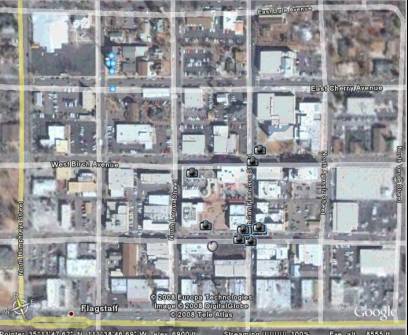|
|
Why not auction off rights to parking? Sounding Board Editorial #2 (February 3, 2008) Dennis Foster |
 |
|
|
||
| This second topic was about installing parking meters in downtown Flagstaff. Apparently, there were meters downtown in the past, although I don't have any memory of it - maybe it was during some years in the late 1980s when I wasn't here. It has received a good deal of attention in the letters section of the paper, with many arguing that charging for parking will push them out of shopping downtown. That is probably unlikely in the extreme, and many places do provide parking. Still, it was a good opportunity to think outside the box and to use this forum to extol the virtues of markets (posted here): | ||
|
|
||
|
Some
downtown merchants want metered street parking to deter
workers from using up spaces all day. Some nearby
residents want residential permits to deter the spillover of
these all-day parkers into their neighborhoods. In the
face of congestion, leaving this resource unpriced is an
inefficient solution. Despite that, private markets find
solutions, and do so in a variety of ways. Many
businesses build their own parking. [Take a look at
downtown Flagstaff on Google Earth.] If there are no
onerous governmental barriers, we should also see the building
of parking lots and/or garages. The market also responds
in more subtle ways – the development of malls for instance.
Malls usually provide sufficient parking, illumination for
night time patrons, and, in some cases, an indoor venue that
helps shoppers more easily visit multiple locations. In
fact, malls are an excellent example of sustainable practices
in resource use. Still, if there is congestion downtown, there should be ways to promote more efficient use of on-street parking. While parking meters are one solution, let’s go one step better by auctioning off the property rights to this parking. Then, business owners could prohibit parking outright, or restrict it (“customers only”) or charge for it, with meters. Even residents could buy parking rights in front of their houses. These rights may not be unlimited – they could last just a few years, and only apply during business hours. We are likely to be best served in this process by looking for market-type solutions to promote creative outcomes. Dennis Foster has a Ph.D. in economics, teaches at the university level and is an avid Grand Canyon hiker. |
||
|
|
||
|
Parking meter technology is getting really interesting. The idea that you can use a credit card, or some stored value card makes it more convenient. The proposal for downtown parking isn't even to have meters, per se, but rather a kiosk for each block where you have to go and buy a permit, and, I guess, put it in your window.
Still, it is a typical one-size-fits-all government solution.
The idea of an auction (or, perhaps, just a chance to bid for spots in
front of one's business/home) for resource allocation is a favorite in
the economics literature, although enforcement costs can sometimes be
insurmountable. But, these days, that doesn't seem likely to be
a problem. If The image, to the right, I got from Google Earth. You can see a sharper image at GoogleMaps, although I can't figure out how to rotate the picture. This is the heart of downtown Flagstaff, and you can note that there is a great deal of off-street parking. Part of the "problem" may be that it is hard to legally allow private property owners the option of renting out their spaces on an ad hoc basis (i.e., because of absurd liability issues). That is a good example of government failure. The resources could be better used, but they aren't. In my researching some of the issues involving parking meters, I found that old meters are for sale in Des Moines, for $15, and in Seattle, for $15-$20. In Redwood, CA, the meter prices are altered throughout the day to insure that about 15% of the spaces are empty, that being deemed the efficient outcome. While this may be considered efficient, I wouldn't necessarily call it "free market parking." |
||
|
|
||

